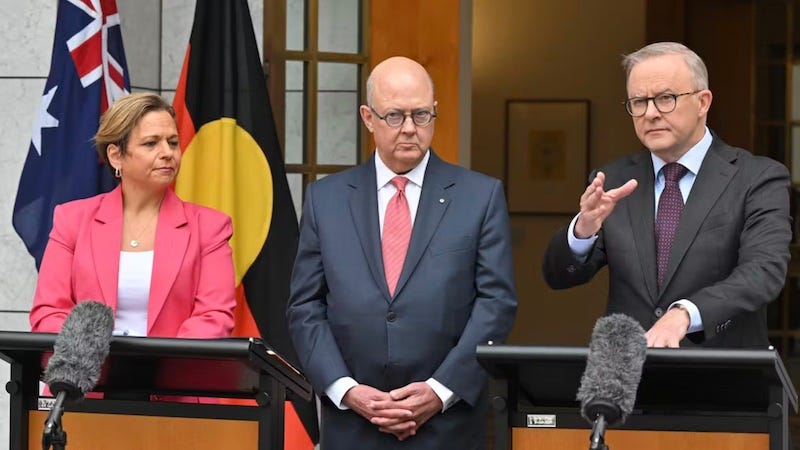Does the ABC have a future in the changing media landscape?
The ABC is at a crossroads and it’s possibly at its lower ebb ever in its history, facing the dual challenges of restoring public trust and adapting to the demands of the digital era. Can it change?
In examining the future of the ABC amid the evolving media landscape and political pressures, it’s crucial to consider recent developments and the broader context in which the broadcaster operates. The departure of Ita Buttrose as ABC’s chair and the appointment of Kim Williams could mark a critical moment in the broadcaster’s history, reflecting a necessary change in its approach to journalism and content creation.
The past five years under Buttrose’s leadership have been disastrous, to say the least, with criticisms centred on perceived biases within its news coverage and political reporting, including accusations of the ABC acting as a mouthpiece for the Liberal Party—regardless of whether the Coalition is in government or not—signal deep-seated problems within its editorial practices. This perception is exacerbated by the recruitment of journalists from predominantly conservative media outlets, such as News Corporation, and a notable shift towards commercial news models, emphasising clickbait journalism over substantive reporting. Esteemed commentators and former ABC journalists, including Kerry O’Brien, have voiced concerns over the broadcaster’s direction, highlighting a fixation on marketing and demographic targeting at the expense of foundational principles that are contained within the charter of the ABC.
In his recent critique, O’Brien shed light on a fundamental challenge facing the ABC: the balance between reaching younger audiences and maintaining the integrity of its content. The drift towards a commercial model, driven by a fear of losing traditional viewership, has sparked debates about the influence of marketing within the organisation and its impact on editorial decisions. The emphasis on appealing to younger demographics, while necessary for relevance in a digital age, risks diluting the ABC’s public broadcasting mandate if not managed with a clear understanding of its core values. Younger audiences are not fools: why should the ABC dumb down its content in a misguided attempt to attract young adults and thirty-somethings who have a sophisticated understanding of media consumption and cultural tastes? Younger audiences are no different to any other demographic group—if the quality is not there, they are not going to engage.
The initial skepticism surrounding Kim Williams’ appointment stems from his history within the Murdoch empire—Foxtel and News Corporation—raising questions about his commitment to public broadcasting. However, Williams’ departure from Murdoch under contentious circumstances and his professed support for public broadcasting suggest potential for a positive shift in the ABC’s leadership. His tenure will be closely watched, as the broadcaster needs strategic guidance to navigate the pressures of modern media consumption while staying true to its public service remit.
There have been many peculiar operational and editorial strategies implemented by the ABC in recent times. The broadcaster faces criticism for decisions perceived to undermine its quality and diversity, such as the axing of programs like The Drum and Lateline, and budget cuts to Foreign Correspondent, changing it from a hard-hitting documentary-style program focused on critical international affairs, to a lifestyle-influenced series based on human interest stories. These actions, coupled with a reliance on dated content and a controversial 24-hour news cycle which includes irrelevant content simply to fill up the time, reflect broader challenges in content strategy and resource allocation.
To reorient the ABC towards a future where it remains a vital, independent voice in Australian media, a comprehensive review of its editorial and operational frameworks is necessary. This includes re-evaluating the role of marketing, addressing biases in political reporting, and investing in diverse, high-quality content that appeals to as many people within the community as possible. The balance between traditional and digital media, along with the imperative to serve as a check on government power, underscores the need for a nuanced approach to public broadcasting in the modern era.
A blueprint for redemption: What can the ABC do?
In an era characterised by the ever-shifting media landscape, the ABC finds itself dealing with substantial challenges. The organisation has compromised its impartiality, relies on antiquated content strategies, and lacks a clear direction in its digital transformation. Most critically, it has suffered a significant loss of credibility. For many years, the ABC was heralded as one of Australia's most trusted brands, consistently ranking in the top two positions.
Its mobile application boldly proclaims—if somewhat arrogantly—ABC News as “Australia’s most trusted news” upon user engagement. However, this claim falls short of reality: in 2018, the ABC was ranked as Australia’s fourth most trusted brand, as per findings by Roy Morgan Research. Recent studies have seen the ABC’s trust plummet to the 18th position, a decline that coincides with Ita Buttrose’s tenure. It is evident that under Buttrose’s leadership, the ABC has experienced a notable decline, for which she needs to held accountable, as does the rest of the ABC board, as well as the managing director, David Anderson.
To reverse this trend, the ABC must embark on a comprehensive overhaul across various domains. This endeavour will demand a considerable investment of time, energy, and resources. Priority areas for immediate action include ensuring editorial independence, enhancing content diversity, implementing effective digital transformation strategies, fostering innovation and partnerships with independent content creators and producers, engaging with the community in meaningful ways, securing funding, and establishing robust leadership and governance structures.
At the core of any news organisation lies its unassailable commitment to editorial independence. However, critiques have surfaced, pointing towards a need for the ABC to recalibrate its editorial direction. The reinforcement of editorial guidelines, coupled with the strengthening of robust internal watchdog mechanisms such as the ABC ombudsman, could serve to realign the ABC with its previous high standards of unbiased reporting, and restoring public faith in its journalistic integrity. While the ABC did establish an internal ombudsman in 2022, this office seems to be too closely aligned to the ABC management—only five of 33 reports prepared by the ombudsman over this time have declared breaches of impartiality, and no breaches have been declared over the ABC’s predominantly pro-Israel coverage over the conflict in Gaza.
The broadcaster has also faced criticism for a homogenisation of content, mirroring rather than differentiating itself from commercial networks, and quite often, it is difficult to discern the difference between ABC news and other commercial enterprises. This scenario underscores the necessity for a strategic change towards the investment in high-quality, original content that not only mirrors but celebrates Australia’s multicultural identity, catering to a broad spectrum of audiences across the nation.
Digital disruption, presenting both formidable challenges and unprecedented opportunities, necessitates a strategic approach from the ABC. Expanding its digital footprint through enhanced streaming services, podcasts, and effective utilisation of social media platforms could significantly bolster its reach, especially among younger demographics. This digital expansion, however, must not detract from the ABC’s core mission but should instead serve to reinforce its commitment to inform, educate, and entertain the Australian public.
Innovation and collaboration emerge as critical pathways forward in the redefinition of public broadcasting within Australia. The ABC is called upon to foster a culture of innovation, exploring new formats and storytelling methodologies. Collaboration with local creators and independent producers promises to yield content that not only engages but accurately reflects the diverse fabric of Australian society.
Audience engagement needs to be a central concern for the ABC to demonstrate its commitment to its public service mandate. By enhancing interactive platforms and deepening community engagement, the ABC can ensure alignment with the evolving needs and preferences of its audience, thereby solidifying its position as Australia’s quintessential public broadcaster.
The broadcaster’s financial stability and funding model represent ongoing challenges in an increasingly competitive media ecosystem. Advocacy for stable, sufficient public funding is critical, as is the exploration of alternative funding mechanisms to ensure financial autonomy and sustainability.
At the governance and leadership level, the ABC stands at a crossroads, and it requires leaders who are committed in their dedication to the values of public broadcasting. The articulation and implementation of a clear, forward-looking strategic vision, anchored in transparent reporting practices, are indispensable for navigating the broadcaster through the complexities of the contemporary media environment.
The national broadcaster has been failing in too many of these areas—an organisation that has been cowered by external conservative influences, lacked the desire to truly transform itself in the digital age, stalled on developing its cultural diversity—the ABC is still predominantly a white Anglospheric media outlet, not so far removed from its cultural makeup and output from the 1930s—and failed to protect its editorial independence. While it could be argued that the ABC’s slow decline commenced in 1996 when the Howard government was elected and proceeded to attack and defund the ABC, there has certainly been a faster decline since the appointment of Buttrose as the chair in 2019, and it’s unclear whether this decline will be, or can be, reversed.
An uncertain future for the ABC
The future of the ABC rests on addressing profound criticisms concerning its management and strategic direction over the past five years. Blueprints for change can always be recommended but there needs to be a political will and an organisation will within the ABC to make these changes, and it’s evident that the current board and management is not equipped to deal with these changes that are necessary for the ABC to survive.
As the landscape of media continues to evolve, the necessity for the ABC to realign its mission with its foundational purpose—serving the public interest through independent news and investigative journalism—has never been more critical. The departure of Buttrose and the entrance of Williams as chair can open a new chapter, but it is a chapter that demands a rigorous examination of past missteps and a clear vision forward.
The ABC’s mimicry of commercial networks, has been a disaster and has raised significant concerns about its identity and value proposition as a public broadcaster. The blending of its content with that of commercial networks, from breakfast shows to drama series, dilutes the unique role the ABC is meant to play in providing distinctive, high-quality programming unavailable elsewhere. This approach not only undermines its public mandate but also contributes to the homogenisation of Australian media, diminishing the diversity of voices and perspectives that are essential for a vibrant democracy.
The shift towards sensationalism and clickbait, driven by an apparent adoption of commercial models, compromises the ABC’s commitment to rigorous and unbiased political coverage. The portrayal of political events, such as its coverage of the recent Dunkley by-election, through a lens favouring conservative perspectives, further alienates audiences seeking balanced and comprehensive reporting. This erosion of trust in the ABC’s political journalism is exacerbated by programming decisions that prioritise entertainment and ‘infotainment’ over informative and critical discourse, as evidenced by the replacement of the political panel show The Drum with comedy entertainment programs like Hard Quiz. Journalism replaced with comedy: it’s the sad story of the modern ABC, and it’s an insult to its audiences.
The critique of the ABC’s management extends to its strategic response to the digital transformation in media consumption. The proliferation of viewing and listening options has significantly altered audience behaviours, yet the ABC’s adaptation to these changes has been lacklustre. A focus on lower-budget but more radical productions and a return to its core of true independence and investigative journalism could re-establish the ABC as a vital source of information and analysis for the Australian public.
The challenge ahead for Williams, and for the ABC as an institution, is formidable. The broadcaster must navigate a path that respects its heritage of public service while innovating to meet the demands of a fragmented media environment. This requires a departure from the pursuit of commercial mimicry towards a rejuvenation of the principles of public broadcasting—integrity, independence, and a commitment to serving the public good, above all else.
To achieve this transformation, a comprehensive overhaul of the ABC’s editorial and managerial practices is imperative. This includes reassessing the influence of marketing within the organisation and facile ‘engagement’ of audiences, realigning content strategies to emphasise diversity and quality, and fostering an environment that prioritises investigative journalism. The chair’s role in setting the cultural tone and strategic direction cannot be understated, and as such, Williams’ leadership will be instrumental in steering the ABC back to its foundational principles.
The ABC stands at a crossroads and it’s possibly at its lower ebb ever in its history, facing the dual challenges of restoring public trust and adapting to the demands of the digital era. The broadcaster’s future success hinges on its ability to embrace its public service mandate, offering content that is not only distinctive and high-quality but also reflective of Australia’s diverse society. This journey will require introspection, bold decision-making, and a steadfast commitment to the values that have long underpinned public broadcasting. Only through such a transformative approach can the ABC hope to reclaim its place as a valued and indispensable institution in Australian life.










